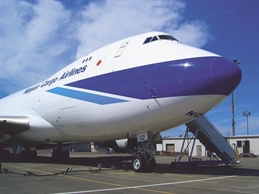
Optimism is taking root in the air cargo industry, thanks to a rise in demand over the past year, which culminated in a peak season that produced a scramble for capacity out of Asia for the first time since 2010.
Nobody is ready to proclaim that the industry is on a firm road to recovery, mindful of the false starts that the past four years have witnessed, but forwarders and carriers are cautiously optimistic for 2015.
“I think ‘guarded optimism’ describes the mood pretty well,” said Bob Imbriani, executive vice president international of forwarder Team Worldwide. “There are global issues – Brazil and India are slower, there are political problems in the Middle East, in Ukraine – but with the US economy looking positive and the improvement on a global basis, people are cautiously optimistic.”
Shawn McWhorter, president for the Americas of Nippon Cargo Airlines, pointed out that the improvement in demand set in some 18 months ago. “Demand improved in 2013, the past summer was very good, and so is the peak. It has been a sustained recovery,” he said.
Shippers are signalling confidence for 2015. “We see from our customers and their forecasts that the outlook for air cargo seems good for the coming year. This could be one of the best years of some time,” said Imbriani.
The recent decline in the price of oil has added to the optimism. “That might open up a whole world that we have not seen for a while. The American consumer has more money in his pocket after he fills up his car,” noted Tim Strauss, vice president of cargo of Hawaiian Air.
He is bullish about 2015. “We are projecting double-digit growth next year,” he said.
Forwarders are already moving to sign up lift for the coming year. “We are now selling our 2015 schedule, and I get enquiries for half charters and full charters for the year,” McWhorter said.
Ron Buschman, managing director of GSA and charter Broker Aerodyne, sees a negative side of the slide of oil prices. “A lot goes to ocean when oil falls below US$80 per barrel,” he warned.
Imbriani also urged caution. “All indicators today are positive, but there are a number of issues that could change this abruptly,” he cautioned. “Everything looks good, but it would not take much to change it.”
The International Air Transport Association, the global airline interest group, also mixed its upbeat assessment of the air cargo business with a note of concern. “We are now back to levels of demand not seen since the 2010 post-recession bounce-back. But the industry is still in the hot seat and under pressure to improve its value offering. Customer expectations have evolved dramatically. Other modes of cargo have improved their competitiveness. Shippers expect the efficiency of electronic processes that they experience in almost every other sector. And when shipping specialty products – such as those requiring cold chain control – they expect quality from end-to-end. The industry is investing to build its future by meeting these expectations,” said Tony Tyler, IATA’s director general and CEO.
One area that is generating a lot of anticipation is e-commerce, especially the rise in on-line shopping. The Chinese market is regarded as a particularly juicy spot there.
“The B2C space in China is exploding,” said Andrew Jillings, CEO of Hong Kong-based forwarder Tigers. “We handle business from China to other parts of the world, but the big business is bringing international companies into China.”
Team Worldwide is also looking to boost its e-commerce logistics activities, which focus largely on moving such traffic in consolidations on international routes for distribution through a variety of networks, but there are other opportunities too, Imbriani said.
“We plan to get more involved in the aerospace industry. this has really gone global,” he said.
From the airline side there has been little noise about new routes or ventures. Nobody is in a rush to bring on new capacity, and freighters that enter the market are predominantly replacements for older cargo planes that will be retired when the new aircraft join the fleet. One carrier that plans to boost its presence in a key market in the year ahead is Air China Cargo. The airline is planning to step up its freighter flights to the US, which were cut back in the downturn.
“We plan daily freighters to Chicago and Los Angeles next year,” said Titus Diu, the carrier’s COO.
By Ian Putzger
Air Freight Correspondent | Toronto



